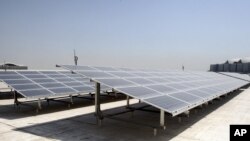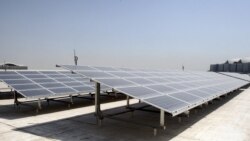Energy is fundamental to international relations. It is a basis of national wealth and power, a mechanism to promote economic development and growth, and a source of market-based competition. In all its complexity, energy will be one of the defining issues of the 21st century.
In a speech in Washington on October 18th, Secretary of State Hillary Clinton outlined how our nation has put energy at the center of international diplomacy. “Energy cuts across the entirety of U.S. foreign policy,” she said. “It’s a matter of national security and global stability. It’s at the heart of the global economy. It’s also an issue of democracy and human rights.”
Toward this end, a Bureau of Energy Resources has been created in the U.S. State Department. Coordinating with our Department of Energy and other agencies, it works to help ensure stable, adequate and affordable energy supplies for ours and other nations; to foster development; and to boost energy market transparency and assure that the natural resource wealth of countries reach their own populations.
Earlier this year, for example, Colombia, with strong support from the U.S., launched a new initiative called “Connecting the Americas 2022.” It aims to achieve universal electrical power access across the Western Hemisphere by the year 2022. This will help maximize the region’s resources, create economies of scale, attract more private investment, increase grid reliability, lower electrical costs for the consumer and increase access to basic services.
To both ensure energy supplies and head off potential energy conflicts, our country also has worked to mediate disputes in areas of the world as disparate as the Sudans and South China Sea. We have encouraged countries to manage shared or disputed energy resources through peaceful negotiations.
As the Arctic region becomes accessible to more nations, we are working with organization of eight nations forming the Arctic Council to promote effective cooperation on energy development and shipping transit there so as to prevent environmental damage.
Another focus is helping to promote competition and prevent monopolies. Anywhere in the world when one nation is overly dependent on another for its energy, that can jeopardize economic and political independence.
Global security is perhaps the most important aspect of energy diplomacy. The United States has led the international community’s dual track efforts to press Iran to address international concerns over its nuclear program while applying tough sanctions targeting Iran’s oil sector.
Meanwhile, energy diplomacy with oil consumers and producers worldwide helped ensure countries had access to adequate energy supplies. To promote economic development in Iraq, we have worked intensively with that nation’s oil sector to identify bottlenecks in their energy infrastructure.
Finally, the U.S. is working toward energy transformation, helping to promote new energy solutions such as wind, solar and other renewables and energy efficiency to meet rising demand and address climate change. Developing cleaner energy resources is central to reducing the world’s carbon emissions and it is at the core of a strong 21st century global economy.
In a speech in Washington on October 18th, Secretary of State Hillary Clinton outlined how our nation has put energy at the center of international diplomacy. “Energy cuts across the entirety of U.S. foreign policy,” she said. “It’s a matter of national security and global stability. It’s at the heart of the global economy. It’s also an issue of democracy and human rights.”
Toward this end, a Bureau of Energy Resources has been created in the U.S. State Department. Coordinating with our Department of Energy and other agencies, it works to help ensure stable, adequate and affordable energy supplies for ours and other nations; to foster development; and to boost energy market transparency and assure that the natural resource wealth of countries reach their own populations.
Earlier this year, for example, Colombia, with strong support from the U.S., launched a new initiative called “Connecting the Americas 2022.” It aims to achieve universal electrical power access across the Western Hemisphere by the year 2022. This will help maximize the region’s resources, create economies of scale, attract more private investment, increase grid reliability, lower electrical costs for the consumer and increase access to basic services.
To both ensure energy supplies and head off potential energy conflicts, our country also has worked to mediate disputes in areas of the world as disparate as the Sudans and South China Sea. We have encouraged countries to manage shared or disputed energy resources through peaceful negotiations.
As the Arctic region becomes accessible to more nations, we are working with organization of eight nations forming the Arctic Council to promote effective cooperation on energy development and shipping transit there so as to prevent environmental damage.
Another focus is helping to promote competition and prevent monopolies. Anywhere in the world when one nation is overly dependent on another for its energy, that can jeopardize economic and political independence.
Global security is perhaps the most important aspect of energy diplomacy. The United States has led the international community’s dual track efforts to press Iran to address international concerns over its nuclear program while applying tough sanctions targeting Iran’s oil sector.
Meanwhile, energy diplomacy with oil consumers and producers worldwide helped ensure countries had access to adequate energy supplies. To promote economic development in Iraq, we have worked intensively with that nation’s oil sector to identify bottlenecks in their energy infrastructure.
Finally, the U.S. is working toward energy transformation, helping to promote new energy solutions such as wind, solar and other renewables and energy efficiency to meet rising demand and address climate change. Developing cleaner energy resources is central to reducing the world’s carbon emissions and it is at the core of a strong 21st century global economy.
















